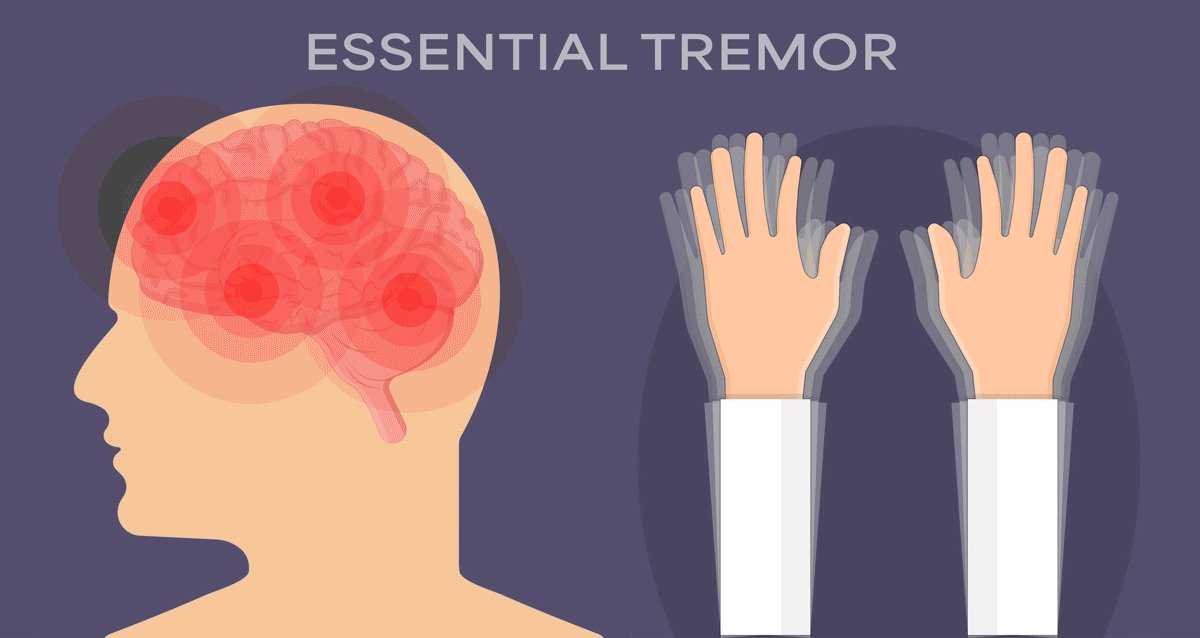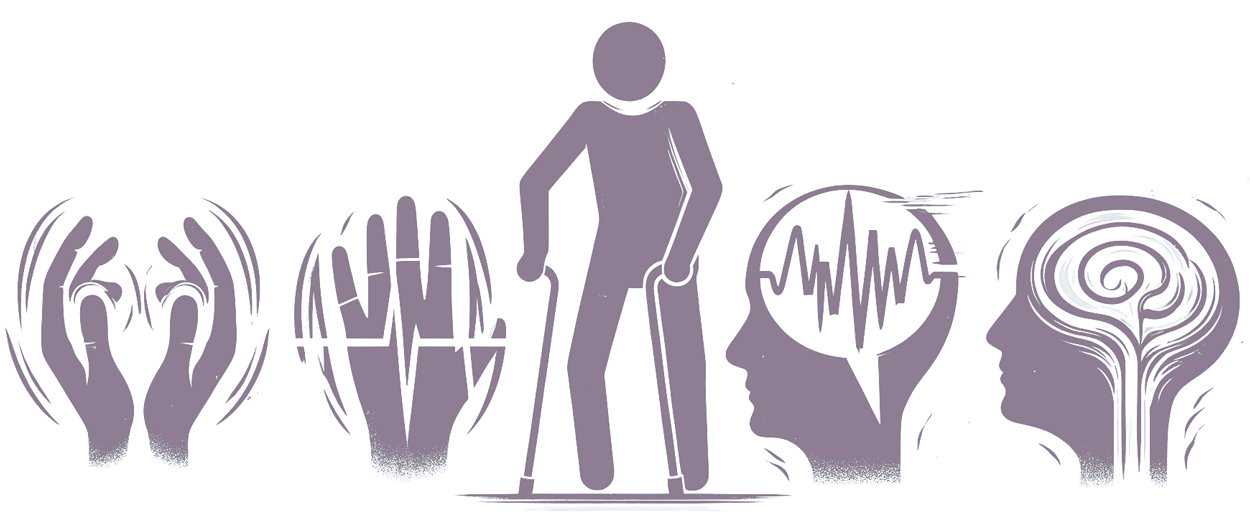We Offer Telemedicine Appointments.
Essential Tremor
Symptoms and Causes
What is a Essential Tremor?
Essential tremor is a neurological disorder characterized by uncontrollable, rhythmic shaking of certain body parts. While the hands are commonly affected, tremors can also occur in the head, voice, and other body parts. This condition is often referred to as benign essential tremor or familial tremor. Essential tremor is a relatively common movement disorder, and while it is not life-threatening, it can significantly impact an individual's quality of life, particularly when performing daily activities.

Types of Essential Tremor
Essential tremors are classified into two main types:
- Familial Essential Tremor: This type has a genetic component and often runs in families. It typically manifests at a young age and progresses gradually.
- Sporadic Essential Tremor: This form occurs without a clear genetic pattern and can affect individuals of any age. The exact cause is often unknown and may develop later in life.
Essential Tremor Stages
Essential tremor typically progresses slowly, and its severity can vary among individuals. The progression of essential tremor is generally described in stages based on the impact on daily activities, ranging from mild to severe. It's important to note that not all individuals with essential tremor will experience the same stages, and the rate of progression can differ. The following are general stages that may be observed:
Mild Stage
- Tremors are present but may not significantly interfere with daily activities.
- Tremors may be subtle and intermittent, becoming noticeable primarily during stress or intentional movements.
- Individuals in this stage may not seek medical attention, or the symptoms may be attributed to stress or aging.
Moderate Stage
- Tremors become more pronounced and may start to affect daily activities.
- Fine motor skills and daily activities, such as drawing, writing, or using utensils, may be noticeably impacted.
- Individuals may notice the tremor more and decide to consult a doctor for a precise diagnosis.
Severe Stage
- Tremors are consistently present and significantly impact daily life.
- Activities requiring precision and coordination, such as buttoning shirts, using tools, or pouring liquids, become challenging.
- Quality of life may be substantially affected, increasing frustration and limitations in social and occupational activities.

It's important to recognize that the progression of essential tremor can be highly individualized, and not everyone will experience each of these stages. Some people may have stable symptoms for an extended period, while others may progress more rapidly. Additionally, essential tremor does not necessarily lead to severe disability in all cases, and many individuals can experience fulfilling lives despite the challenges posed by the condition.
Essential Tremor vs. Parkinson’s Disease
Essential tremor (ET) and Parkinson's disease (PD) are both neurological disorders that involve tremors, but they have unique differences in terms of their symptoms, causes, and progression.
| Aspect | Essential Tremor (ET) | Parkinson's Disease (PD) |
|---|---|---|
| Tremors | Shaking during movement, for example, when reaching for something or holding an object. | Shaking at rest, especially when not doing anything. |
| Onset and Progression | Starts slowly and progresses gradually. | Has a gradual onset, with symptoms getting worse over time. |
| Other Symptoms | Mainly tremors, without many other issues. | Involves tremors, stiffness, slowness of movement, and other symptoms. |
| Hereditary Factor | Often runs in families. | Can have genetic links, but many cases aren't inherited. |
| Alcohol Impact | Some relief from tremors after drinking alcohol. | Alcohol does not usually affect tremors. |
| Diagnosis | Diagnosed based on symptoms and ruling out other causes. | Diagnosis involves examining symptoms, medical history, and sometimes brain scans. |
| Medication | Medications like beta-blockers help manage tremors. | Medications like levodopa and dopamine agonists are used to alleviate symptoms. |
While both conditions involve tremors, their characteristics, onset, and additional symptoms help differentiate essential tremor from Parkinson's disease.
Essential Tremor Symptoms
The most common symptom is a tremor, and while it usually affects the hands, it can also involve other areas. Here are the key symptoms of essential tremor.

Tremor
- The hallmark symptom is a rhythmic shaking, often seen in the hands. Tremors may also affect the arms, head, voice, and, less commonly, the legs.
- The tremors associated with essential tremor are typically action tremors, meaning they occur during purposeful movements rather than at rest. Common triggers include reaching for an object, holding a utensil, or performing fine motor tasks.
Variable Presentation
Essential tremor can vary in severity and may progress over time. Some individuals may experience mild and infrequent tremors, while others may have more pronounced and persistent shaking.
Intention Tremor
The tremor associated with essential tremor are often exacerbated by intentional movements or when trying to perform precise tasks. For example, the shaking may become more noticeable when attempting to write, eat, or pour liquids.
Head Tremor
In some cases, essential tremor may manifest as a nodding or shaking of the head, contributing to difficulties with tasks like holding the head steady.
Voice Tremor
Essential tremor can affect the muscles involved in speech, leading to a quivering or shaky voice. This symptom may impact communication and vocal clarity.
Worsening with Stress
Stress and anxiety can exacerbate essential tremor symptoms. Individuals may notice increased tremors during periods of heightened stress or emotional distress.
Gradual Onset
Essential tremor often develops gradually, and symptoms may not be noticeable in the early stages. Over time, however, the tremors may become more pronounced and interfere with daily activities.
What Causes Essential Tremor?
The precise cause of essential tremor is not completely understood, and it is considered a complex neurological disorder with environmental and genetic factors contributing to its development. Essential tremor is often classified as an "idiopathic" condition, meaning the underlying cause is unknown. However, several factors are believed to play a role in the development of essential tremor:
Genetic Factors
There is a strong genetic component associated with essential tremor. Many individuals with essential tremor have a family history of the condition, suggesting a hereditary predisposition.
Abnormal Brain Activity
Essential tremor is thought to involve abnormal communication between certain areas of the brain, particularly the cerebellum and thalamus. These regions are responsible for coordinating movement and regulating muscle activity.
Neurotransmitter Imbalance
Changes in the levels of neurotransmitters, such as gamma-aminobutyric acid (GABA), may play a role in essential tremor. GABA serves as a neurotransmitter that aids in the modulation of nerve impulses by exerting inhibitory effects, and an imbalance may contribute to the abnormal firing of neurons.
Essential Tremor Risk Factors
Age and Hormonal Factors:
- Essential tremors often become more apparent with age, and the risk of developing the condition increases with advancing years.
- Hormonal factors may also play a role, as some women report changes in tremor severity during hormonal fluctuations, such as pregnancy or menopause.
Family History
Having a family history of essential tremor increases the risk of developing the condition.
Environmental Factors
Exposure to toxins or substances such as alcohol, heavy metals, or certain medications may contribute to tremor symptoms in susceptible individuals.
Other Medical Conditions
Essential tremor may be associated with other medical conditions such as Parkinson's disease or dystonia, although it is distinct from these conditions.
Medications
Some medications, particularly stimulants or certain antidepressants, may exacerbate or trigger essential tremor in susceptible individuals.
At Miami Neouroscience Center we help patients with Essential Tremor using the latest techiques and treatments, contact us today.
Prevention of Essential Tremor
Prevention of essential tremor is challenging because the exact causes of the condition are not fully understood. However, certain lifestyle adjustments and strategies may help manage symptoms and potentially reduce the risk of essential tremor progression:
Limit Alcohol and Caffeine
Both alcohol and caffeine can exacerbate tremors in some individuals. Limiting or avoiding consumption of alcoholic beverages and caffeinated drinks may help reduce tremor severity.
Stress Management
Stress and anxiety can worsen essential tremor symptoms. Practicing relaxation techniques such as deep breathing, meditation, or yoga may help manage stress levels and alleviate tremors.
Regular Exercise
Engaging in regular physical activity can improve overall health and may help reduce tremor severity. Activities such as walking, swimming, or tai chi can be beneficial. Exercise also promotes relaxation and may help alleviate stress-related tremors.
Healthy Diet
Eating a balanced diet rich in fruits, vegetables, whole grains, and lean proteins can support overall well-being. Some individuals may find that avoiding certain foods or additives, such as monosodium glutamate (MSG) or artificial sweeteners, helps reduce tremor severity.
Adequate Sleep
Ensuring an adequate amount of sleep each night is essential for overall health and well-being. Fatigue and sleep deprivation can exacerbate tremors, so aim for 7-9 hours of quality sleep per night.
Avoiding Triggers
Identify and avoid factors that exacerbate tremors, such as extreme temperatures, fatigue, or overexertion. Understanding individual triggers can help minimize symptom flare-ups.
Medication Management
If prescribed medications are contributing to tremors or worsening symptoms, consult with a healthcare provider to explore alternative treatment options or adjust medication dosages.
Regular Medical Check-ups
Regularly monitoring health and discussing any changes in tremor severity with a healthcare provider is important. They can provide guidance on symptom management and offer support tailored to individual needs.
It's important to note that while these strategies may help manage essential tremor symptoms, there is no guaranteed way to prevent the condition from developing or progressing. Additionally, individuals with a family history of essential tremor may have a higher risk of developing the condition, and prevention efforts may have limited impact in these cases.
FAQ - Frequently Asked Questions About Essential Tremor
Yes, essential tremor is generally progressive, with symptoms worsening over time. However, the rate of progression varies among individuals.
Yes, familial essential tremor has a genetic component, and if a family member has it, there is an increased risk of developing the condition. However, not all cases are inherited, and sporadic cases also occur.
Yes, individuals with essential tremors may benefit from reducing caffeine intake, managing stress, and practicing relaxation techniques. Physical therapy and adaptive devices can also aid in daily activities.
No, essential tremor and Parkinson's disease are distinct neurological disorders. While both involve tremors, their characteristics, causes, and progression differ. Essential tremors often focus more on intentional movements, while Parkinson's disease involves resting tremors and other motor symptoms.
Factors such as stress, fatigue, caffeine, temperature changes, and certain medications can exacerbate essential tremors.
Diagnosis is typically based on medical history, physical examination, and ruling out other possible causes. There are no specific tests for essential tremors, but sometimes neuroimaging or other tests may be used to rule out other conditions.
Treatment options include medications, such as beta-blockers or anti-seizure drugs, surgical intervention like deep brain stimulation (DBS) or noninvasive procedure such as focused ultrasound (FUS). Occupational therapy and lifestyle modifications may also help manage symptoms.
Yes, lifestyle changes such as avoiding triggers like caffeine and stress, getting enough sleep, and practicing relaxation techniques may help reduce the severity of essential tremors.
Yes, there are support groups, online forums, and resources available where individuals with essential tremors and their caregivers can find information, support, and community.
If you suspect you have essential tremors, consult with a healthcare professional for a thorough evaluation and diagnosis. They can guide treatment options and management strategies tailored to your situation.
To see if you have Essential Tremor and want to learn more about your treatment options please call us at 786.871.6806 or schedule a consultation today!